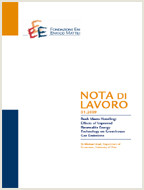An Assessment of the Energy-Efficiency Gap and Its Implications for Climate Change Policy

Data
08.04.2015
08.04.2015
Autori
Todd D. Gerarden (Harvard University); Richard G. Newell (Duke University); Robert N. Stavins (Harvard University); Robert C. Stowe (Harvard University)
Codice JEL
Q4, Q48, Q5, Q55
Q4, Q48, Q5, Q55
Parole chiave:
Energy Efficiency, Climate Change Policy
Energy Efficiency, Climate Change Policy
Publisher
Climate Change and Sustainable Development
Climate Change and Sustainable Development
Editor
Carlo Carraro
Carlo Carraro
Improving end-use energy efficiency—that is, the energy-efficiency of individuals, households, and firms as they consume energy—is often cited as an important element in efforts to reduce greenhouse-gas (GHG) emissions. Arguments for improving energy efficiency usually rely on the idea that energy-efficient technologies will save end users money over time and thereby provide low-cost or no-cost options for reducing GHG emissions. However, some research suggests that energy-efficient technologies appear not to be adopted by consumers and businesses to the degree that would seem justified, even on a purely financial basis. We review in this paper the evidence for a range of explanations for this apparent “energy-efficiency gap.” We find most explanations are grounded in sound economic theory, but the strength of empirical support for these explanations varies widely. Retrospective program evaluations suggest the cost of GHG abatement varies considerably across different energy-efficiency investments and can diverge substantially from the predictions of prospective models. Findings from research on the energy-efficiency gap could help policy makers generate social and private benefits from accelerating the diffusion of energy-efficient technologies—including reduction of GHG emissions.
***
Suggested citation: Gerarden, T. D., R. G. Newell, R. N. Stavins, R. C. Stowe, (2015), ‘An Assessment of the Energy-Efficiency Gap and Its Implications for Climate Change Policy’, Nota di Lavoro 28.2015, Milan, Italy: Fondazione Eni Enrico Mattei
